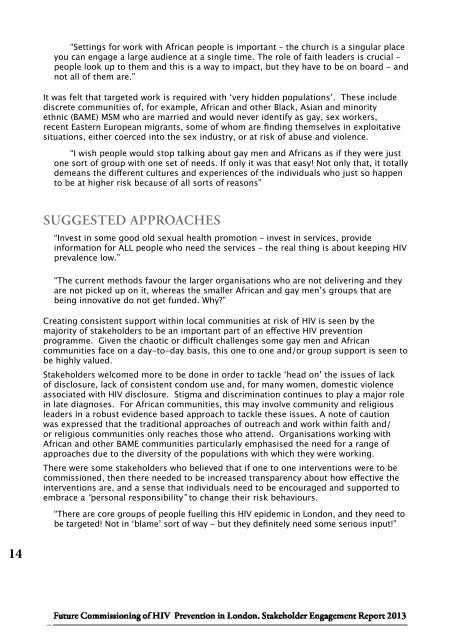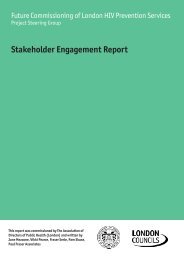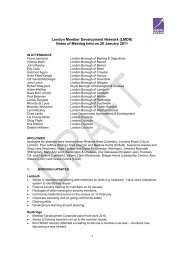Stakeholder Engagement Report - London Councils
Stakeholder Engagement Report - London Councils
Stakeholder Engagement Report - London Councils
You also want an ePaper? Increase the reach of your titles
YUMPU automatically turns print PDFs into web optimized ePapers that Google loves.
“Settings for work with African people is important – the church is a singular place<br />
you can engage a large audience at a single time. The role of faith leaders is crucial –<br />
people look up to them and this is a way to impact, but they have to be on board - and<br />
not all of them are.”<br />
It was felt that targeted work is required with ‘very hidden populations’. These include<br />
discrete communities of, for example, African and other Black, Asian and minority<br />
ethnic (BAME) MSM who are married and would never identify as gay, sex workers,<br />
recent Eastern European migrants, some of whom are finding themselves in exploitative<br />
situations, either coerced into the sex industry, or at risk of abuse and violence.<br />
“I wish people would stop talking about gay men and Africans as if they were just<br />
one sort of group with one set of needs. If only it was that easy! Not only that, it totally<br />
demeans the different cultures and experiences of the individuals who just so happen<br />
to be at higher risk because of all sorts of reasons”<br />
Suggested Approaches<br />
“Invest in some good old sexual health promotion – invest in services, provide<br />
information for ALL people who need the services – the real thing is about keeping HIV<br />
prevalence low.”<br />
“The current methods favour the larger organisations who are not delivering and they<br />
are not picked up on it, whereas the smaller African and gay men’s groups that are<br />
being innovative do not get funded. Why?”<br />
Creating consistent support within local communities at risk of HIV is seen by the<br />
majority of stakeholders to be an important part of an effective HIV prevention<br />
programme. Given the chaotic or difficult challenges some gay men and African<br />
communities face on a day-to-day basis, this one to one and/or group support is seen to<br />
be highly valued.<br />
<strong>Stakeholder</strong>s welcomed more to be done in order to tackle ‘head on’ the issues of lack<br />
of disclosure, lack of consistent condom use and, for many women, domestic violence<br />
associated with HIV disclosure. Stigma and discrimination continues to play a major role<br />
in late diagnoses. For African communities, this may involve community and religious<br />
leaders in a robust evidence based approach to tackle these issues. A note of caution<br />
was expressed that the traditional approaches of outreach and work within faith and/<br />
or religious communities only reaches those who attend. Organisations working with<br />
African and other BAME communities particularly emphasised the need for a range of<br />
approaches due to the diversity of the populations with which they were working.<br />
There were some stakeholders who believed that if one to one interventions were to be<br />
commissioned, then there needed to be increased transparency about how effective the<br />
interventions are, and a sense that individuals need to be encouraged and supported to<br />
embrace a “personal responsibility” to change their risk behaviours.<br />
“There are core groups of people fuelling this HIV epidemic in <strong>London</strong>, and they need to<br />
be targeted! Not in ‘blame’ sort of way - but they definitely need some serious input!”<br />
14




